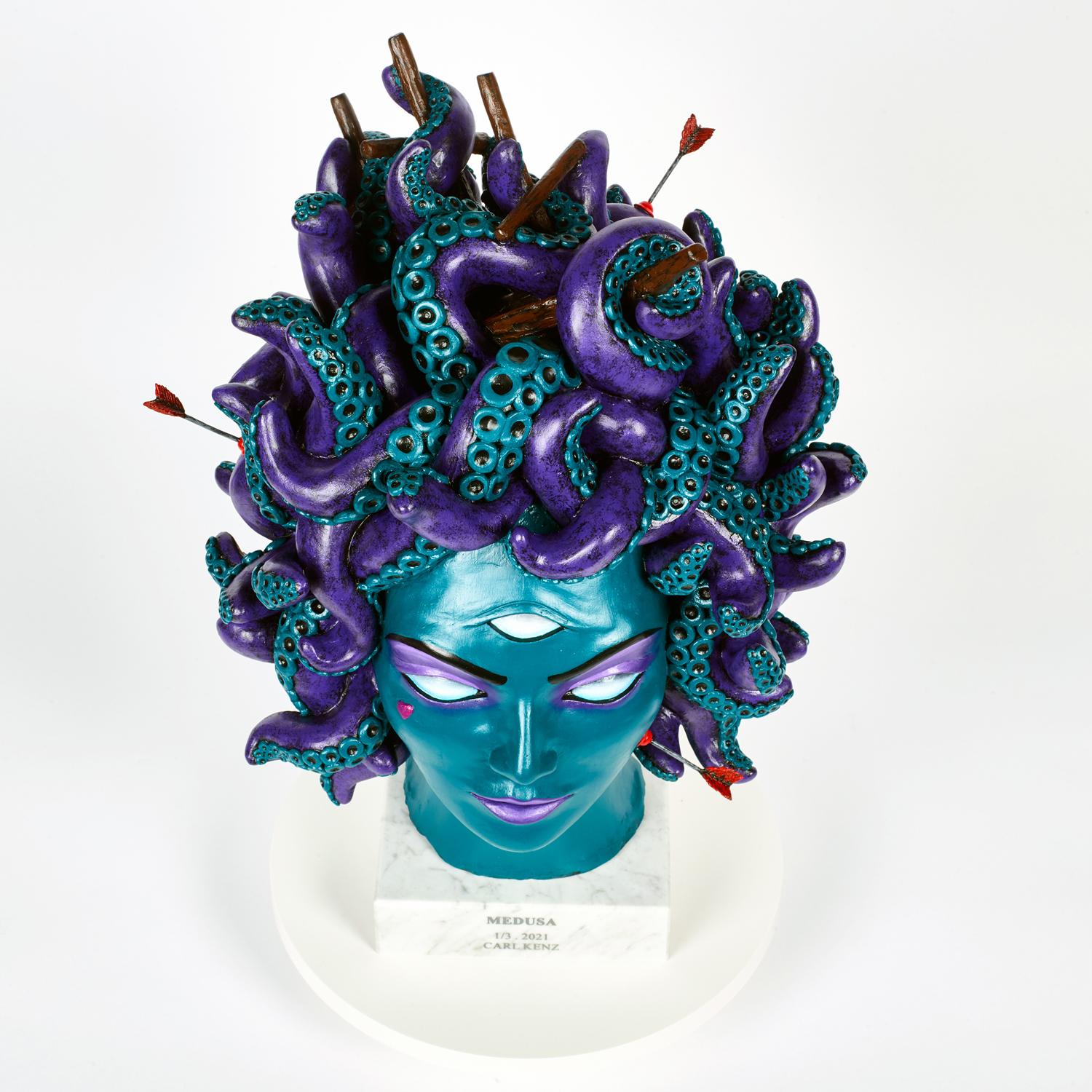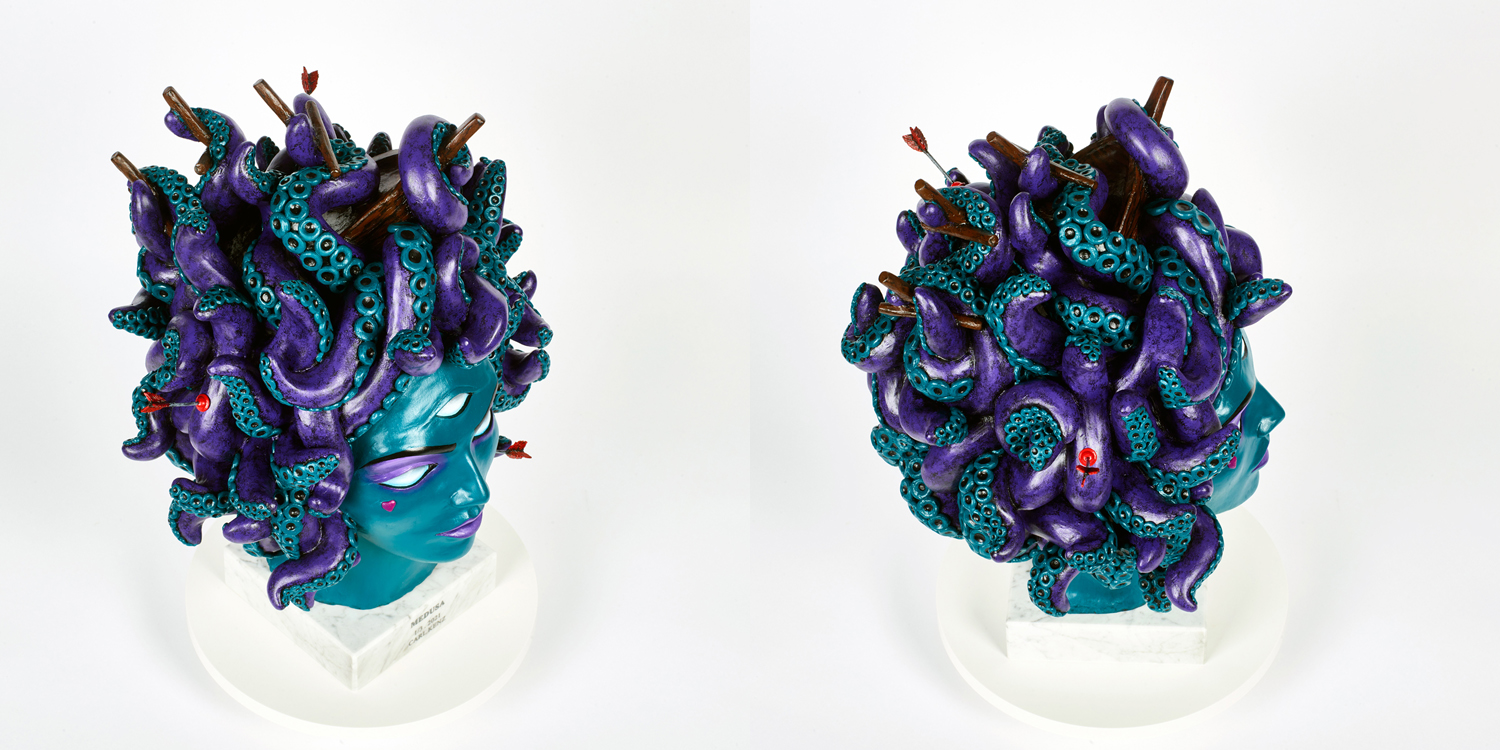MEDUSA
Already in the Archaic, an epoch of political and cultural development in ancient Greece, around 800-450 BC. Medusa appeared (for the first times) in art and literature for the first times. The so-called monstrous and terrifying 3 sisters, Medusa (the queen), Stheno (the mighty) and Euryale (the long jumper), also called Gorgons, were children of the primeval sea gods Phorkys and Keto and are therefore considered children of the sea. Both Phorkys and Keto were children of Gaia, the earth itself and Pontos, the sea. The long-suffering Medusa, a powerful figure with the ability to kill and protect. Everyone who looks at her freeze to stone. Yet she was the only one of the 3 sisters to possess a mortally spiritual nature. At the latest after Cellini’s bronze statue from 1554, which shows Perseus with the freshly cut Medusa head in his hand, standing victorious on her body, has cemented Medusa’s reputation as a monster. However, the work had a political background. Remove the fearful and judgmental male gaze and the framing of the Roman patriarchy at that time to depict the triumph of the Medici family over the Florentine population and the matriarchy, open up completely new perspectives on this tragic beauty with an extremely ambivalent character. Artists of the time vied for the favor and admiration of the Medicis with their works, instead of questioning things and in the appropriate context. It took several centuries before Medusa became more than just a monster again. A powerful deity, female horror and beautiful sacrifice, a symbol of intoxication, petrification and irresistible attractiveness, moves between femme fatale and blood drenched beheadings, Medusa embodies everything this and much more. A common projection surface for fear and desire and at the same time a symbol of female anger and a true heroine, which is demonized by the very patriarchal forces on which she seeks revenge. An ancient legend or an everlasting presence?
MEDUSA
Schon in der Archaik, einer Epoche der politischen und kulturellen Entwicklung im antiken Griechenland, etwa 800 – 450 v. Chr. tauchte Medusa in Kunst und Literatur bereits die ersten Male auf. Die sogenannten monströsen und furchteinflößenden 3 Schwestern, Medusa (die Königin), Stheno (die Mächtige) und Euryale (die Weitspringerin), auch Gorgonen genannt, waren Kinder der urtümlichen Meeresgötter Phorkys und Keto und gelten somit als Kinder des Meeres. Sowohl Phorkys wie auch Keto waren dabei Kinder von Gaia, der Erde selbst und Pontos, dem Meer. Die leidgeprüfte Medusa, eine mächtige Gestalt mit der Fähigkeit zu töten und zu beschützen und jeden, der sie anblickt, zu Stein erstarren zu lassen, besaß als einzige der 3 Schwestern eine sterblich spirituelle Natur. Spätestens nach Cellinis Bronzestatue von 1554 welche Perseus mit dem frisch abgeschlagenen Medusenhaupt in der Hand zeigt, siegreich auf ihrem Körper stehend, hat Medusas Ruf als Monster zementiert. Das Werk hatte jedoch einen politischen Hintergrund. Entfernt man nun den ängstlichen und verurteilende männlichen Blick und den damaligen Rahmen (Framing) des römischen Patriarchats zur Darstellung des Triumphs der Familie Medici über die florentinische Bevölkerung und das Matriarchat, erschließen sich völlig neue Sichtweisen auf diese tragische Schönheit mit äußerst ambivalenten Charakter. Damalige Künstler buhlten mit Ihren Werken regelrecht um die Gunst und Bewunderung der Medicis, anstatt Dinge zu hinterfragen und in den dementsprechenden Kontext zu bringen. Es dauerte daraufhin einige Jahrhunderte, bis Medusa wieder mehr wurde als nur ein Ungeheuer. Eine mächtige Gottheit, weibliche Schreckgestalt und wunderschönes Opfer, ein Sinnbild der Intoxikation, Versteinerung und unwiderstehlicher Attraktivität, bewegt sich zwischen Femme fatale und blutüberströmten Enthauptungen, Medusa verkörpert all dies und noch viel mehr. Eine gemeinsame Projektionsfläche für Angst und Verlangen und gleichzeitig ein Symbol weiblicher Wut und einer wahren Heldin, die von eben denjenigen patriarchalen Kräften dämonisiert wird, an denen sie sich rächen will. Eine uralte Sage oder immerwährende Gegenwart?
Sculpture
37 x 37 x 52 cm
circa 19 KG
Ceramic Gypsum/Bianco Carrara Marble
limited edition of 3
incl. Certificate Of Authenticity
hand made and painted by Carl KENZ
comes in customized transport box
2021
Official Release: 11.11.2021 / 11:11 (CET)
AVAILABLE
go to shop


















